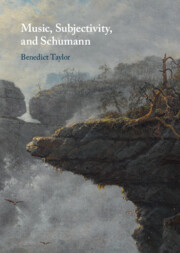Book contents
- Music, Subjectivity, and Schumann
- Music, Subjectivity, and Schumann
- Copyright page
- Contents
- Examples
- Acknowledgements
- Abbreviations
- Preamble
- Prosopopoeic Preliminaries
- Part I Hearing Subjects
- Part II Hearing Presence
- Part III Hearing Absence
- 6 Absence of the Other
- 7 Absence of the Self
- Part IV Hearing Others
- Epilogue
- Bibliography
- Index
7 - Absence of the Self
from Part III - Hearing Absence
Published online by Cambridge University Press: 07 April 2022
- Music, Subjectivity, and Schumann
- Music, Subjectivity, and Schumann
- Copyright page
- Contents
- Examples
- Acknowledgements
- Abbreviations
- Preamble
- Prosopopoeic Preliminaries
- Part I Hearing Subjects
- Part II Hearing Presence
- Part III Hearing Absence
- 6 Absence of the Other
- 7 Absence of the Self
- Part IV Hearing Others
- Epilogue
- Bibliography
- Index
Summary
The absence of lyrical voice in pieces such as Schumann’s Manfred and Ballads for Declamation may point not only to the absence of the other but also to the absence of the subject itself. ‘Absence of the Self’ explores the potential loss of self implied by the absence of lyrical voice, highlighted in the missing silent ‘inner voice’ of the Humoreske, which forms an apt exemplification of later twentieth-century accounts of the illusory, ‘barred’ subject proposed by such thinkers as Lacan, Kristeva, and Žižek, or the empty centre at the heart of the Eichendorff Liederkreis that results from the absence of a unified subject position and any sense of narrative continuity.
- Type
- Chapter
- Information
- Music, Subjectivity, and Schumann , pp. 230 - 266Publisher: Cambridge University PressPrint publication year: 2022

